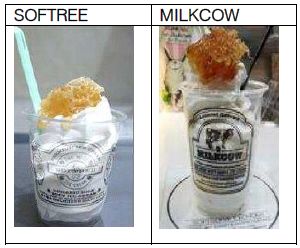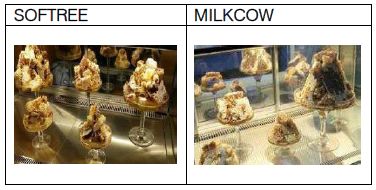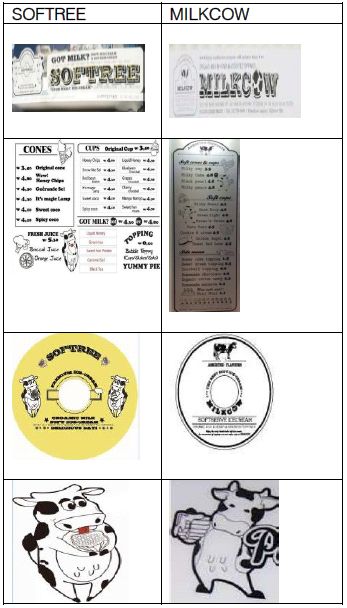NUPL Co., Ltd. v. Mcostar Co., Ltd., Seoul Central District Court [Dist. Ct.], 2014Ga-Hap524716, Nov. 27, 2014 (S. Kor.)
On November 27, 2014, the Seoul Central District Court ruled that Mcostar Co., Ltd. d/b/a Milkcow unfairly copied the trade dress (specifically, the signature dish and cafe-design elements) of NUPL Co., Ltd. d/b/a Softree, in the first South Korean court interpretation of the "catch-all" amendment to the Unfair Competition Prevention and Trade Secrets Act (UCPA), effective January 31, 2014. The Court granted a permanent injunction. The case is now pending appeal before the Seoul High Court.
Plaintiff Softree is an organic ice-cream chain that opened its first shop in 2013 and became popular for its signature soft-serve dessert topped with real honeycomb. Defendant Milkcow is a cafe franchise created in 2014 that also began serving ice cream with a honeycomb topping. Milkcow launched a national advertising campaign featuring celebrity spokespeople and also became quite popular.

Softree claimed that Milkcow's honeycomb dessert and cafe-design elements infringed its rights under the UCPA, which defines ten types of "acts of unfair competition" under Article 2(1). The UCPA protects a variety of intellectual-property rights including unregistered trade dress, trademarks, and designs, as well as geographical indications, domain names, and trade secrets. Softree did not bring any claims under the Trademark Act since it did not own any relevant trademark registrations.
Milkcow countered that Softree's honeycomb dessert was a simple idea that was not protectable, and further argued that Softree's cafe-design elements were common. The Court rejected these arguments and found that Milkcow's dessert violated the "dead copy" provision of the UCPA that prohibits the unauthorized use of another's identical or similar sign and the exhibition of goods whose shape has been copied from another's. The exceptions to this provision—that the shape of the goods is common and at least three years have passed since the original product was first produced anywhere in the world—did not apply.
In the landmark ruling, Softree also prevailed under the "catch-all" provision of the UCPA, which prohibits "an act of infringing a person's right to profit by using that person's product, which was the result of considerable effort and investment, without authorization for one's business through a method that contravenes fair commercial trade practice or competition order." Under this generally-broad provision, for which civil but not criminal remedies are available, the Court found that Milkcow imitated Softree's exact expression of its honeycomb dessert idea and used design elements that were identical (ice cream cone displays and honeycombs):

or very similar (exterior signage, menu boards, ice cream cone rings and cow logo):

The Court recognized that these six elements, created through considerable effort and investment, collectively gave Softree its unique cafe atmosphere and amounted to protectable trade dress under the UCPA.
Both Softree and Milkcow had begun to expand internationally, mostly in Asia. This lawsuit does not name Milkcow's franchisees as defendants. Nevertheless, the ruling does impact Milkcow's franchise agreements because it prohibits Milkcow from allowing others to manufacture or sell the honeycomb dessert and from using the six elements in connection with its cafe or franchise businesses. Therefore the ruling is likely to indirectly affect Milkcow's overseas franchisees.
This expansion of trade-dress rights is especially important for the restaurant industry, with its focus on brick-and-mortar shops. Though the South Korean Trademark Act allows for registration of three-dimensional marks and various forms of trade dress that could help protect a restaurant's intellectual property, many business owners may not pursue registration. Since common law rights are not recognized in South Korea, the expanded UCPA offers recourse for business owners who lack registered trademark rights. If this ruling is upheld on appeal, the "catch all" provision of the UCPA would amount to an expanded law for plaintiffs seeking to protect the fruits of their labor.
[Note: the above images are from Kim & Chang Intellectual Property's Legal Updates of December 11, 2014.]
The content of this article is intended to provide a general guide to the subject matter. Specialist advice should be sought about your specific circumstances.

